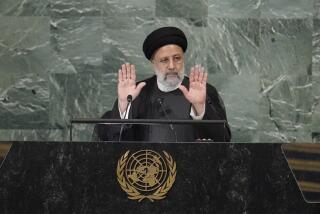Iran’s Khamenei rejects direct talks with U.S. on nuclear program
- Share via
WASHINGTON -- Iranian Supreme Leader Ayatollah Ali Khamenei rejected the U.S. offer of direct talks on his country’s disputed nuclear program, deepening doubts about the prospects that Tehran’s upcoming discussions with six world powers over the issue will make progress.
Khamenei, who sets his country’s policy on the issue, said in comments carried Thursday on his personal website that talks “will not settle the issue” when the United States has imposed sanctions and is threatening Iran with attack if it doesn’t yield.
“You take up arms against the nation of Iran and say: ‘Negotiate or we will fire,’” Khamenei said in a speech to Iranian civilian and air force officials. “But you should know that pressure and negotiations are not compatible and our nation will not be intimidated by these actions.”
“They say the ball is in Iran’s court,” he said. “But you have to be accountable and explain what it means to offer talks while simultaneously continuing pressure and threats.”
Vice President Joe Biden last weekend repeated President Obama’s offer that the United States would open talks with Tehran if Iranian officials showed they were serious.
While Khamenei didn’t directly address his attitude toward Iran’s upcoming talks with six world powers, including the U.S., to be held Feb. 26 in Kazakhstan, his comments suggested again that he does not intend to give way to international pressure. The United States and European powers have sharply increased their economic pressure on Iran in the past year, yet Iran gave no ground in three international meetings last year.
The White House, asked about Khamenei’s comments, said the administration is still hoping Iran will show a willingness to negotiate, but is prepared to further ratchet up pressure if it doesn’t.
“We believe there is still a window to resolve this issue diplomatically, and we are pleased that Iran has confirmed that the next round of talks with the [six world powers] will take place in Almaty, Kazakhstan, on February 26,” said Tommy Vietor, a spokesman for the National Security Council.
But he added: “As long as Iran fails to address these concerns, we will continue to increase the pressure on the regime and isolate it internationally. We have been clear that the United States is determined to prevent Iran from acquiring a nuclear weapon.”
Two other officials, Iran’s foreign minister and Khamenei’s representative to the Iranian Revolutionary Guard Corps, have in recent days also rejected the possibility of direct talks with the United States.
ALSO:
Study: Afghans paid nearly $4 billion in bribes last year
U.S. drone use could set dangerous example for rogue powers
Tunisian opposition leader Chokri Belaid shot dead outside his home
More to Read
Sign up for Essential California
The most important California stories and recommendations in your inbox every morning.
You may occasionally receive promotional content from the Los Angeles Times.











